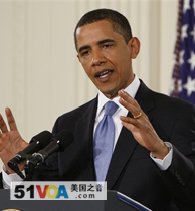Washington
30 April 2009
 |
| President Obama speaking at news conference, 29 Apr 2009 |
View or listen to news conference
U.S. President Barack Obama marked his 100th day in office Wednesday by rallying support for his policies, and tackling an unfolding health crisis.
On day 100, the president took questions from the public at a school near St. Louis, Missouri. "It is great to be back in the middle of America, where common sense often reigns," he said.
And he fielded inquiries from reporters beneath the chandeliers of the White House East Room at his third formal news conference.
Originally, the White House downplayed the 100 day marker. But in the end, it embraced the chance to showcase the president's agenda. "I am proud of what we have achieved, but I am not content. I am pleased with our progress, but I am not satisfied," Mr. Obama said.
At his news conference, the president said one of the biggest surprises of his first months in office has been the sheer number of crucial issues that have come to the fore at the same time.
As his second 100 days begins, Mr. Obama faces yet another challenge: the first national health emergency of his presidency. "We are continuing to closely monitor the emerging cases of the H1N1 flu virus throughout the United States," he said.
The president made clear he has no plans to close the border with Mexico. He said the new flu strain is a reason for concern, but not panic. "The key now I think is to make sure that we are maintaining great vigilance," he said.
Unlike his two earlier prime-time press conferences, there was no one dominating issue. On domestic matters, Mr. Obama said he is hopeful the big American automakers will remain viable, and he praised Democrats in Congress for passing a budget blueprint almost identical to the one he proposed in February.
The president also defended his decision to release Bush administration legal documents that authorized harsh interrogation techniques used on terror detainees. He said the information gathered by interrogators could have been obtained using other, more moral methods. "We could have gotten this information in other ways, in ways that are consistent with our values, ways that are consistent with who we are," he said.
President Obama was then asked about the situation in Pakistan. He said the government there is fragile, but he said he is confident Pakistan's nuclear arsenal will remain secure. "Primarily, initially, because the Pakistani army I think recognizes the hazards of those weapons falling into the wrong hands," he said.
Mr. Obama said Pakistan's military is recognizing that the biggest threat to their nation is coming from extremists inside the country. "You are starting to see some recognition just in the last few days that the obsession with India as the mortal threat to Pakistan is misguided and that their biggest threat right now comes internally," he said.
The president also talked about the recent increase in violence in Iraq. Speaking on a day when two car bombs in Baghdad killed more than 40 people, he said there is reason for concern. But he also said the level of violence is lower than last year. And he made clear his timetable for withdrawing U.S. forces has not been affected.